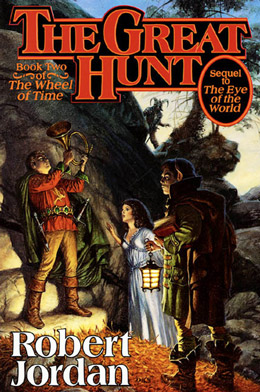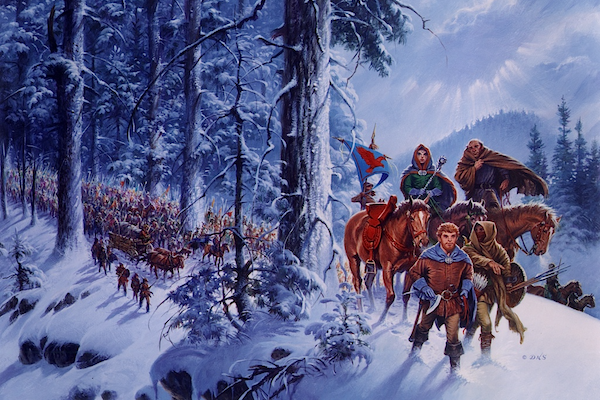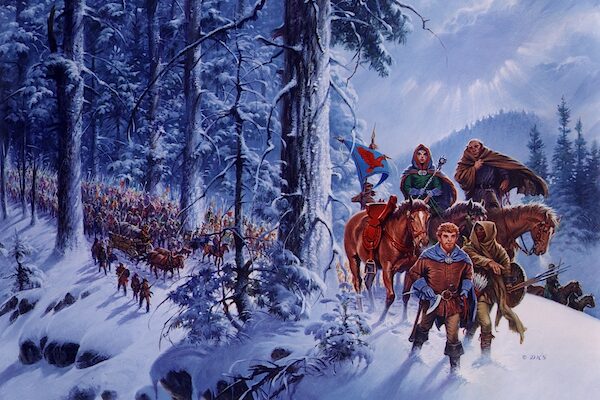Double, double, toil and trouble, fire burn, and Wheel of Time Reread Redux bubble!
Today’s Redux post will cover Chapter 31 of The Great Hunt, originally reread in this post.
All original posts are listed in The Wheel of Time Reread Index here, and all Redux posts will also be archived there as well. (The Wheel of Time Master Index, as always, is here, which has links to news, reviews, interviews, and all manner of information about the Wheel of Time in general on Tor.com.)
The Wheel of Time Reread is also available as an e-book series! Yay!
All Reread Redux posts will contain spoilers for the entire Wheel of Time series, so if you haven’t read, read at your own risk.
And now, the post!
Chapter 31: On the Scent
The Cairhienin Reader rose. “Aes Sedai?” she said softly. Verin inclined her head, and the Reader made a full curtsy.
As quiet as they had been, the words “Aes Sedai” ran through the crowd in tones ranging from awe to fear to outrage. Everyone was watching now—not even Cuale gave any attention to his own burning inn—and Rand thought a little caution might not be amiss after all.
I’ve had various criticisms over the course of the series both over how the Aes Sedai are portrayed and how they are perceived, but overall I do think Jordan did a very nice job of blending his own world’s gender-flipped respect of women in power, with our own world’s inherent fear of the idea of a woman with power, particularly one with mystical power—a fact which continues to be reflected in countless stories and depictions (and various historical atrocities, natch) into the present day.
The Whitecloaks call the Aes Sedai “witches,” and that is a loaded word. I was initially uncertain whether Jordan realized to what extent that term is loaded, but he certainly had at least some idea, as indicated by the fact that he put it in the mouths of the most blatantly intolerant group of bigots on his entire fictional continent. He most likely knew very well to what extent that term has been used to condemn, intimidate, and control women who have dared to assume positions of influence and power in their communities through knowledge of herbcraft, midwifery and medical lore, especially that associated with female concerns in particular, which historically in Western culture have long been tainted with the stigma of uncleanliness and sin, and thus made it easy to extend that condemnation to those who dealt with those “unclean” issues.
Calling Aes Sedai “witches,” therefore, carries far more powerfully negative connotations than just accusing them of being people who wield magical power. It carries with it an accusation that is very specifically leveled against women. It is an implicit accusation that women holding any sort of power at all is dangerous, unnatural and wrong, and it is (therefore) a phenomenon which must be stamped out wherever it occurs.
Whether the Whitecloaks themselves took that implicit accusation to that extent is irrelevant (though I would argue that their general treatment of women, and Valda’s later treatment of Morgase in particular, bolsters the notion that they do in fact take it to that extent), because it is the real-world parallel that I think is being commented upon here.
That’s how I took it, at any rate. And I continue to be pleased that Jordan’s response to that implicit accusation is basically what most sane people’s response is: that power itself is neutral, and it is how it is wielded that makes the difference, and that that difference doesn’t actually have anything to do with gender at all, but with the character of the person involved.
Perrin slouched at the table, studying his hands clasped on the tabletop. To his nose, the room smelled of beeswax used to polish the paneling. It was him, he thought. Rand is the Shadowkiller. Light, what’s happening to all of us?
I distinctly remember this revelation as being one of the coolest in the entirety of TGH, probably only rivaled by the conversation with Artur Hawkwing at the end of the book for “self-realization” moments. Even if, admittedly, it’s not actually Rand having the realization moment himself here. Basically, there are few things that are going to goose my geek meter more awesomely than finding out that sentient wolves have such respect for you that they’ve given you a name, all right, even if you can’t talk to them. Perrin being “Young Bull” is cool, don’t get me wrong, but Rand being “ Shadowkiller” is boss. I’m not even going to bother being sorry about it.
“There are Darkfriends among the high as well as the low,” Verin said smoothly. “The mighty give their souls to the Shadow as often as the weak.” Ingtar scowled as if he did not want to think of that.
Yeah, I bet he doesn’t.
“They will know I’m no lord. I am a shepherd, and a farmer.” Ingtar looked skeptical. “I am, Ingtar. I told you I am.” Ingtar shrugged; he still did not look convinced. Hurin stared at Rand with flat disbelief.
Burn me, Perrin thought, if I didn’t know him, I wouldn’t believe it either. Mat was watching Rand with his head tilted, frowning as if looking at something he had never seen before. He sees it, too, now. “You can do it, Rand,” Perrin said. “You can.”
“It will help,” Verin said, “if you don’t tell everyone what you are not. People see what they expect to see. Beyond that, look them in the eye and speak firmly. The way you have been talking to me,” she added dryly, and Rand’s cheeks colored, but he did not drop his eyes.
I remember that basically what I got from this is that if I were to be dropped into Randland all unexpected, that people would assume I was nobility too, just because I would assume I had the right to look people in the eye and assert my own opinions. This pleased me—as no doubt it was meant to. Heh.
But I think there is something to be said for that image—that many modern folk, if mysteriously transported into less modern times, would mostly likely be taken for (crass) nobles simply because many people these days have unconsciously internalized the idea that a person has inherent worth independent of their financial status, and fuck you if you think otherwise. This is not to suggest that class warfare is a thing of the past, because it most certainly is not, but these days it is most certainly being carried out on a much more subtle level than the historically popular practice of overtly assuming that if you were a poor commoner, you must have some innate flaw that meant you deserved it. That assumption is still there, but it is carefully camouflaged; it is no longer acceptable to espouse that idea openly. Which isn’t awesome, obviously, but driving it underground is a step toward its eventual elimination, or so I hope.
But my point is, there’s nothing like reading about class differences in pseudo-historical settings to make you realize how much times have changed in the real world—thankfully, for the most part.
Aside from everything else, it is nice, post-TGS, to know that Verin’s motives in all of this are more or less completely pure. Which is weird, maybe, when we know that she actually is Black Ajah, but knowing that she is also a (completely awesome) double agent pretty much clears any suspicion that she has anything other than Rand’s survival and wellbeing in mind in everything she does. It’s quite a source of stress relief, really, when reading the early books now, when previously we had no such assurance. Ahhh.
…Aaaand I was going to continue on, but the next two chapters really need to go together (and also deserve to have proper justice done to them), so we’re gonna stop here. Have a lurvely early fall weekend, y’all, and I’ll see you next Tuesday!













